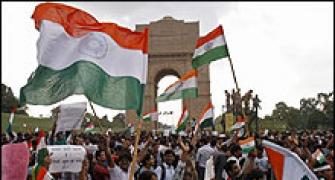Economics assumes rational behaviour and rational choices made by freely contracting parties meeting to transact business in free and open markets. Abba Lerner, a renowned economist noted, 'Economics has gained the title of the Queen of the Social Sciences by choosing solved political problems as its domain.' In other words, economists cleverly assume away all the political problems that come in the way of rational people making rational choices.
Free and open markets don't happen by themselves. It takes a lot of political effort to organise them and keep them open and free. Nor are all the participants in the market rational players. One among them, the State, is the biggest player of all, and its actions may be rational only in the context of its own agenda that has little to do with what economists imagine.
It may, for instance, prefer just to preserve the power of its existing masters rather than maximise utility for themselves or others. How does society arrive at a point where rational people are able to meet freely in free and open markets to transact business? That is in the realm of politics and it is to politics we must turn for answers.
Put simply, before you can talk economics you need to get the politics right to set up the institutional framework that free and open markets require to work their magic. How do societies arrive at such a point? That is the key question that economics doesn't address but we must.
Whether a society arrives at the juncture where it finds the creation and maintenance of free and open markets imperative, is a complex function of its particular history and the way power is configured among the various players in that society. [I will use State and society interchangeably relying on the context to clear any misunderstanding.] This point is worth examining in detail because it posits two different things.
First, all the payers in a society must find it in their interest to let markets intermediate business among them. That presupposes power is more or less evenly dispersed among players and they can agree on a certain set of universal rules, which will then be applied to all in the realm uniformly.
Second, the path by which a society arrives at such a happy confluence itself shapes the configuration of markets and the rules that govern them. In other words, the particular history of players in their past dealings with each other colours the outcome. Clearly, getting markets right is neither easy nor automatic as we assume. A lot of hard work and trial and error go into the process before even the most rudimentary of markets becomes functional.
What then are the essential characteristics of a society that lead it to establish free and open markets? In a significant book, Why Nations Fail, Daran Acemoglu and James A Robinson argue that societies which can create institutions to guarantee [a] reasonably dispersed power among players such that none can dominate all others; [b] a centralised and uniform application of agreed rules of business throughout the realm that guarantee equality and fairness; and [c] incentives that motivate the masses to contribute openly and freely to the wellbeing of society or State, are able to arrive at the promised nirvana over time.
These three conditions are necessary and usually sufficient. They are not path-independent though. The specifics of how society arrives there and what it needs to do depend on their particular history over time. Point to note here is that a functioning democracy more or less corresponds to power being widely dispersed in a society. A constitutional form of governance in turn guarantees both an adequate centralisation of rule-making and application to governance uniformly. But a democracy by itself doesn't achieve the third pre-condition: that is, a fair and equitable system of incentives is in place to motivate people to give off their best.
India commenced its journey in recorded history with a terribly mixed slate. It is therefore not surprising that we are still not at a point where we can rely on markets to organise our economy smoothly with its invisible hand producing optimum prosperity for all. We have come a long way but the ultimate goal eludes us. How might we get closer?
Begin by noting that our caste system makes us one of the most unequal, blatantly oppressive, almost predatory societies. The caste system is so ubiquitous and pervasive that those of us brought up in its milieu are almost blind to its inequity. That's true of even the oppressed.
To the oppressed, as Mayawati was prone to remind us, it matters little if the oppressor was a devout caste Hindu or a Muslim invader from distant lands out on a pillaging expedition. To the oppressed they are all the same. Caste has divided us with catastrophic results for our civilisation and polity. We have come a long way after independence. But the backlash against affirmative action is worrisome. If we regress on the equality front, all will be lost.
On the other hand, our democracy guarantees we will get there eventually through trial and error whether we like it or not. Hence it would be best if we got on with the job anyway. The legacy of caste and tribal exclusion has left us with a large number of people who cannot be easily absorbed into a market-based economy.
With the caste system goes our system of hereditary succession in professions, businesses and politics that militates against a merit-based society. The two together present formidable barriers to entry for meritorious people. For every hereditary succession, a hundred otherwise meritorious people are demotivated.
The British gave us two unintended but invaluable gifts. First, they brought about the essential centralisation of rule-making in a parliament and arranged for an administrative and court system that applied those rules across the realm. Could we ever have done this on our own given our constantly squabbling regional satrapies and 26 different languages? In their knitting together of India we thus have the first of the conditions necessary -- a centralised polity with uniform rules. They may not be ideal but they make a great beginning compared to what went before them.
The second gift came to us from our founding fathers by way of the Constitution itself.
We tend to underestimate the huge step forward the Constitution means. Societies spend hundreds of years trying to shake off rules devised by reference to divinity and substitute them with rules made by mutual consent of the members of society. The transition from 'divine rule' to 'constitutional rule' is neither easy nor bloodless. Yet, in what must be a remarkable feat in recorded history, we made that transition in 1947-50 and haven't looked back since.
This is not to say our transition is either complete or will be problem-free. The debate about secularism is just one of the pointers to such problems. Nevertheless, compared to other contemporary societies, we have accomplished a near miracle whose importance to our eventual success cannot be underestimated.
It is on the design and implementation of incentives that motivate our people to give of their best that we appear to have floundered the most. We have simply not been able to clearly articulate a vision here that is both true to human nature and is able to harness individual capabilities to produce prosperity for all. What are we doing wrong?
First off we need to recognise that people work hard and develop ideas for themselves in order to benefit and profit from them. Yes, there are saints among us but a society has no business demanding humans turn into saints in order to be its members. Humans will be humans and a society must learn to work with what is, not what it considers its ideal. An individual's responsibility to others ends when her tax dues are paid. To expect anything more is to be foolish.
Second, if a person works hard, innovates, etc, how does she store the value she creates for herself when she needs it? It is here that a fair, transparent, uniform and inviolable system of property rights becomes critical. If a person earns, but cannot store value safely, free from expropriation or surreptitious stealing by the State, why should she work hard?
Yet, India's record on property rights is simply horrendous. We have expropriated property from businesses, we have denied property rights to tribals, we don't enforce property rights properly, and worse of all, the government cheats us of our property stored as money by merrily inflating away its value or subjecting it to stealthy taxes.
Either way, while we are relatively free in allowing people to earn, we don't allow them to safely store the value of their labour. Not surprisingly, people hide their wealth, send it abroad or bury it in useless gold. The failure to respect a person's store of value is our major failure in the schema of incentivising people to give of their best.
Our politicians have taken the easy way out to reap votes through populism rather the hard way to incentivise people. We have our outliers, who despite all hurdles in the way, have pursued novel ideas, and have created enormous wealth and value for society. But, by and large, politicians have chosen to correct our legacy problems of inequality by pulling down outliers rather than giving incentives to underperformers to pull themselves up. The problem is acute because politicians don't raid your current income as much as your stored wealth -- usually surreptitiously.
People work for themselves and their near and dear ones. A State's role is to enable them to do so without infringing on similar rights of others in a free and fair manner. The right to enjoy the fruits of what one creates is at the heart of an individual's motivation to excel. When we defeat nature's way of motivating people, we defeat ourselves as a society. India must realise that an unfair and shabby system of property rights and lack of respect therefor are holding back her people.
Sonali Ranade is a trader in international markets








